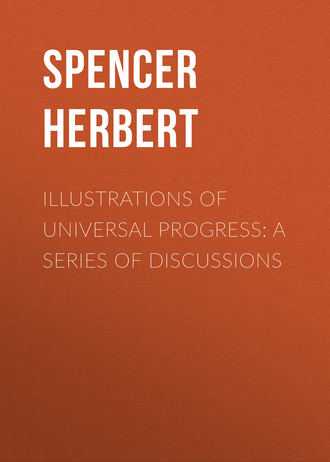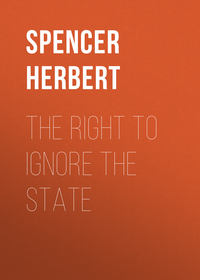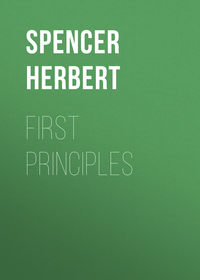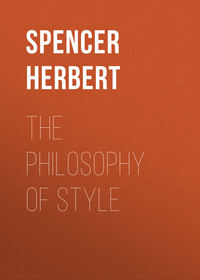 полная версия
полная версияIllustrations of Universal Progress: A Series of Discussions
As might be expected, we find that, having a common origin and like general functions, these several controlling agencies act during each era with similar degrees of vigour. Under the Chinese despotism, stringent and multitudinous in its edicts and harsh in the enforcement of them, and associated with which there is an equally stern domestic despotism exercised by the eldest surviving male of the family, there exists a system of observances alike complicated and rigid. There is a tribunal of ceremonies. Previous to presentation at court, ambassadors pass many days in practising the required forms. Social intercourse is cumbered by endless compliments and obeisances. Class distinctions are strongly marked by badges. The chief regret on losing an only son is, that there will be no one to perform the sepulchral rites. And if there wants a definite measure of the respect paid to social ordinances, we have it in the torture to which ladies submit in having their feet crushed. In India, and indeed throughout the East, there exists a like connection between the pitiless tyranny of rulers, the dread terrors of immemorial creeds, and the rigid restraint of unchangeable customs: the caste regulations continue still unalterable; the fashions of clothes and furniture have remained the same for ages; suttees are so ancient as to be mentioned by Strabo and Diodorus Siculus; justice is still administered at the palace-gates as of old; in short, "every usage is a precept of religion and a maxim of jurisprudence."
A similar relationship of phenomena was exhibited in Europe during the Middle Ages. While all its governments were autocratic, while feudalism held sway, while the Church was unshorn of its power, while the criminal code was full of horrors and the hell of the popular creed full of terrors, the rules of behaviour were both more numerous and more carefully conformed to than now. Differences of dress marked divisions of rank. Men were limited by law to a certain width of shoe-toes; and no one below a specified degree might wear a cloak less than so many inches long. The symbols on banners and shields were carefully attended to. Heraldry was an important branch of knowledge. Precedence was strictly insisted on. And those various salutes of which we now use the abridgments were gone through in full. Even during our own last century, with its corrupt House of Commons and little-curbed monarchs, we may mark a correspondence of social formalities. Gentlemen were still distinguished from lower classes by dress; people sacrificed themselves to inconvenient requirements – as powder, hooped petticoats, and towering head-dresses; and children addressed their parents as Sir and Madam.
A further corollary naturally following this last, and almost, indeed, forming part of it, is, that these several kinds of government decrease in stringency at the same rate. Simultaneously with the decline in the influence of priesthoods, and in the fear of eternal torments – simultaneously with the mitigation of political tyranny, the growth of popular power, and the amelioration of criminal codes; has taken place that diminution of formalities and that fading of distinctive marks, now so observable. Looking at home, we may note that there is less attention to precedence than there used to be. No one in our day ends an interview with the phrase "your humble servant." The employment of the word Sir, once general in social intercourse, is at present considered bad breeding; and on the occasions calling for them, it is held vulgar to use the words "Your Majesty," or "Your Royal Highness," more than once in a conversation. People no longer formally drink each other's healths; and even the taking wine with each other at dinner has ceased to be fashionable. The taking-off of hats between gentlemen has been gradually falling into disuse. Even when the hat is removed, it is no longer swept out at arm's length, but is simply lifted. Hence the remark made upon us by foreigners, that we take off our hats less than any other nation in Europe – a remark that should be coupled with the other, that we are the freest nation in Europe.
As already implied, this association of facts is not accidental. These titles of address and modes of salutation, bearing about them, as they all do, something of that servility which marks their origin, become distasteful in proportion as men become more independent themselves, and sympathise more with the independence of others. The feeling which makes the modern gentleman tell the labourer standing bareheaded before him to put on his hat – the feeling which gives us a dislike to those who cringe and fawn – the feeling which makes us alike assert our own dignity and respect that of others – the feeling which thus leads us more and more to discountenance all forms and names which confess inferiority and submission; is the same feeling which resists despotic power and inaugurates popular government, denies the authority of the Church and establishes the right of private judgment.
A fourth fact, akin to the foregoing, is, that these several kinds of government not only decline together, but corrupt together. By the same process that a Court of Chancery becomes a place not for the administration of justice, but for the withholding of it – by the same process that a national church, from being an agency for moral control, comes to be merely a thing of formulas and tithes and bishoprics – by this same process do titles and ceremonies that once had a meaning and a power become empty forms.
Coats of arms which served to distinguish men in battle, now figure on the carriage panels of retired grocers. Once a badge of high military rank, the shoulder-knot has become, on the modern footman, a mark of servitude. The name Banneret, which once marked a partially-created Baron – a Baron who had passed his military "little go" – is now, under the modification of Baronet, applicable to any one favoured by wealth or interest or party feeling. Knighthood has so far ceased to be an honour, that men now honour themselves by declining it. The military dignity Escuyer has, in the modern Esquire, become a wholly unmilitary affix. Not only do titles, and phrases, and salutes cease to fulfil their original functions, but the whole apparatus of social forms tends to become useless for its original purpose – the facilitation of social intercourse. Those most learned in ceremonies, and most precise in the observance of them, are not always the best behaved; as those deepest read in creeds and scriptures are not therefore the most religious; nor those who have the clearest notions of legality and illegality, the most honest. Just as lawyers are of all men the least noted for probity; as cathedral towns have a lower moral character than most others; so, if Swift is to be believed, courtiers are "the most insignificant race of people that the island can afford, and with the smallest tincture of good manners."
But perhaps it is in that class of social observances comprehended under the term Fashion, which we must here discuss parenthetically, that this process of corruption is seen with the greatest distinctness. As contrasted with Manners, which dictate our minor acts in relation to other persons, Fashion dictates our minor acts in relation to ourselves. While the one prescribes that part of our deportment which directly affects our neighbours; the other prescribes that part of our deportment which is primarily personal, and in which our neighbours are concerned only as spectators. Thus distinguished as they are, however, the two have a common source. For while, as we have shown, Manners originate by imitation of the behaviour pursued towards the great; Fashion originates by imitation of the behaviour of the great. While the one has its derivation in the titles, phrases, and salutes used to those in power; the other is derived from the habits and appearances exhibited by those in power.
The Carib mother who squeezes her child's head into a shape like that of the chief; the young savage who makes marks on himself similar to the scars carried by the warriors of his tribe (which is probably the origin of tattooing); the Highlander who adopts the plaid worn by the head of his clan; the courtiers who affect greyness, or limp, or cover their necks, in imitation of their king; and the people who ape the courtiers; are alike acting under a kind of government connate with that of Manners, and, like it too, primarily beneficial. For notwithstanding the numberless absurdities into which this copyism has led the people, from nose-rings to ear-rings, from painted faces to beauty-spots, from shaven heads to powdered wigs, from filed teeth and stained nails to bell-girdles, peaked shoes, and breeches stuffed with bran, – it must yet be concluded, that as the strong men, the successful men, the men of will, intelligence, and originality, who have got to the top, are, on the average, more likely to show judgment in their habits and tastes than the mass, the imitation of such is advantageous.
By and by, however, Fashion, corrupting like these other forms of rule, almost wholly ceases to be an imitation of the best, and becomes an imitation of quite other than the best. As those who take orders are not those having a special fitness for the priestly office, but those who see their way to a living by it; as legislators and public functionaries do not become such by virtue of their political insight and power to rule, but by virtue of birth, acreage, and class influence; so, the self-elected clique who set the fashion, gain this prerogative, not by their force of nature, their intellect, their higher worth or better taste, but gain it solely by their unchecked assumption. Among the initiated are to be found neither the noblest in rank, the chief in power, the best cultured, the most refined, nor those of greatest genius, wit, or beauty; and their reunions, so far from being superior to others, are noted for their inanity. Yet, by the example of these sham great, and not by that of the truly great, does society at large now regulate its goings and comings, its hours, its dress, its small usages. As a natural consequence, these have generally little or none of that suitableness which the theory of fashion implies they should have. But instead of a continual progress towards greater elegance and convenience, which might be expected to occur did people copy the ways of the really best, or follow their own ideas of propriety, we have a reign of mere whim, of unreason, of change for the sake of change, of wanton oscillations from either extreme to the other – a reign of usages without meaning, times without fitness, dress without taste. And thus life à la mode, instead of being life conducted in the most rational manner, is life regulated by spendthrifts and idlers, milliners and tailors, dandies and silly women.
To these several corollaries – that the various orders of control exercised over men have a common origin and a common function, are called out by co-ordinate necessities and co-exist in like stringency, decline together and corrupt together – it now only remains to add that they become needless together. Consequent as all kinds of government are upon the unfitness of the aboriginal man for social life; and diminishing in coerciveness as they all do in proportion as this unfitness diminishes; they must one and all come to an end as humanity acquires complete adaptation to its new conditions. That discipline of circumstances which has already wrought out such great changes in us, must go on eventually to work out yet greater ones. That daily curbing of the lower nature and culture of the higher, which out of cannibals and devil worshippers has evolved philanthropists, lovers of peace, and haters of superstition, cannot fail to evolve out of these, men as much superior to them as they are to their progenitors. The causes that have produced past modifications are still in action; must continue in action as long as there exists any incongruity between man's desires and the requirements of the social state; and must eventually make him organically fit for the social state. As it is now needless to forbid man-eating and Fetishism, so will it ultimately become needless to forbid murder, theft, and the minor offences of our criminal code. When human nature has grown into conformity with the moral law, there will need no judges and statute-books; when it spontaneously takes the right course in all things, as in some things it does already, prospects of future reward or punishment will not be wanted as incentives; and when fit behaviour has become instinctive, there will need no code of ceremonies to say how behaviour shall be regulated. Thus, then, may be recognised the meaning, the naturalness, the necessity of those various eccentricities of reformers which we set out by describing. They are not accidental; they are not mere personal caprices, as people are apt to suppose. On the contrary, they are inevitable results of the law of relationship above illustrated. That community of genesis, function, and decay which all forms of restraint exhibit, is simply the obverse of the fact at first pointed out, that they have in two sentiments of human nature a common preserver and a common destroyer. Awe of power originates and cherishes them all: love of freedom undermines and periodically weakens them all. The one defends despotism and asserts the supremacy of laws, adheres to old creeds and supports ecclesiastical authority, pays respect to titles and conserves forms; the other, putting rectitude above legality, achieves periodical instalments of political liberty, inaugurates Protestantism and works out its consequences, ignores the senseless dictates of Fashion and emancipates men from dead customs.
To the true reformer no institution is sacred, no belief above criticism. Everything shall conform itself to equity and reason; nothing shall be saved by its prestige. Conceding to each man liberty to pursue his own ends and satisfy his own tastes, he demands for himself like liberty; and consents to no restrictions on this, save those which other men's equal claims involve. No matter whether it be an ordinance of one man, or an ordinance of all men, if it trenches on his legitimate sphere of action, he denies its validity. The tyranny that would impose on him a particular style of dress and a set mode of behaviour, he resists equally with the tyranny that would limit his buyings and sellings, or dictate his creed. Whether the regulation be formally made by a legislature, or informally made by society at large – whether the penalty for disobedience be imprisonment, or frowns and social ostracism, he sees to be a question of no moment. He will utter his belief notwithstanding the threatened punishment; he will break conventions spite of the petty persecutions that will be visited on him. Show him that his actions are inimical to his fellow-men, and he will pause. Prove that he is disregarding their legitimate claims – that he is doing what in the nature of things must produce unhappiness; and he will alter his course. But until you do this – until you demonstrate that his proceedings are essentially inconvenient or inelegant, essentially irrational, unjust, or ungenerous, he will persevere.
Some, indeed, argue that his conduct is unjust and ungenerous. They say that he has no right to annoy other people by his whims; that the gentleman to whom his letter comes with no "Esq." appended to the address, and the lady whose evening party he enters with gloveless hands, are vexed at what they consider his want of respect, or want of breeding; that thus his eccentricities cannot be indulged save at the expense of his neighbours' feelings; and that hence his nonconformity is in plain terms selfishness.
He answers that this position, if logically developed, would deprive men of all liberty whatever. Each must conform all his acts to the public taste, and not his own. The public taste on every point having been once ascertained, men's habits must thenceforth remain for ever fixed; seeing that no man can adopt other habits without sinning against the public taste, and giving people disagreeable feelings. Consequently, be it an era of pig-tails or high-heeled shoes, of starched ruffs or trunk-hose, all must continue to wear pig-tails, high-heeled shoes, starched ruffs, or trunk-hose to the crack of doom.
If it be still urged that he is not justified in breaking through others' forms that he may establish his own, and so sacrificing the wishes of many to the wishes of one, he replies that all religious and political changes might be negatived on like grounds. He asks whether Luther's sayings and doings were not extremely offensive to the mass of his contemporaries; whether the resistance of Hampden was not disgusting to the time-servers around him; whether every reformer has not shocked men's prejudices, and given immense displeasure by the opinions he uttered. The affirmative answer he follows up by demanding what right the reformer has, then, to utter these opinions; whether he is not sacrificing the feelings of many to the feelings of one: and so proves that, to be consistent, his antagonists must condemn not only all nonconformity in actions, but all nonconformity in thoughts.
His antagonists rejoin that his position, too, may be pushed to an absurdity. They argue that if a man may offend by the disregard of some forms, he may as legitimately do so by the disregard of all; and they inquire – Why should he not go out to dinner in a dirty shirt, and with an unshorn chin? Why should he not spit on the drawing-room carpet, and stretch his heels up to the mantel-shelf?
The convention-breaker answers, that to ask this, implies a confounding of two widely-different classes of actions – the actions that are essentially displeasurable to those around, with the actions that are but incidentally displeasurable to them. He whose skin is so unclean as to offend the nostrils of his neighbours, or he who talks so loudly as to disturb a whole room, may be justly complained of, and rightly excluded by society from its assemblies. But he who presents himself in a surtout in place of a dress-coat, or in brown trousers instead of black, gives offence not to men's senses, or their innate tastes, but merely to their prejudices, their bigotry of convention. It cannot be said that his costume is less elegant or less intrinsically appropriate than the one prescribed; seeing that a few hours earlier in the day it is admired. It is the implied rebellion, therefore, that annoys. How little the cause of quarrel has to do with the dress itself, is seen in the fact that a century ago black clothes would have been thought preposterous for hours of recreation, and that a few years hence some now forbidden style may be nearer the requirements of Fashion than the present one. Thus the reformer explains that it is not against the natural restraints, but against the artificial ones, that he protests; and that manifestly the fire of sneers and angry glances which he has to bear, is poured upon him because he will not bow down to the idol which society has set up.
Should he be asked how we are to distinguish between conduct that is absolutely disagreeable to others, and conduct that is relatively so, he answers, that they will distinguish themselves, if men will let them. Actions intrinsically repugnant will ever be frowned upon, and must ever remain as exceptional as now. Actions not intrinsically repugnant will establish themselves as proper. No relaxation of customs will introduce the practice of going to a party in muddy boots, and with unwashed hands; for the dislike of dirt would continue were Fashion abolished to-morrow. That love of approbation which now makes people so solicitous to be en règle would still exist – would still make them careful of their personal appearance – would still induce them to seek admiration by making themselves ornamental – would still cause them to respect the natural laws of good behaviour, as they now do the artificial ones. The change would simply be from a repulsive monotony to a picturesque variety. And if there be any regulations respecting which it is uncertain whether they are based on reality or on convention, experiment will soon decide, if due scope be allowed.
When at length the controversy comes round, as controversies often do, to the point whence it started, and the "party of order" repeat their charge against the rebel, that he is sacrificing the feelings of others to the gratification of his own wilfulness, he replies once for all that they cheat themselves by mis-statements. He accuses them of being so despotic, that, not content with being masters over their own ways and habits, they would be masters over his also; and grumble because he will not let them. He merely asks the same freedom which they exercise; they, however, propose to regulate his course as well as their own – to cut and clip his mode of life into agreement with their approved pattern; and then charge him with wilfulness and selfishness, because he does not quietly submit! He warns them that he shall resist, nevertheless; and that he shall do so, not only for the assertion of his own independence, but for their good. He tells them that they are slaves, and know it not; that they are shackled, and kiss their chains; that they have lived all their days in prison, and complain at the walls being broken down. He says he must persevere, however, with a view to his own release; and in spite of their present expostulations, he prophesies that when they have recovered from the fright which the prospect of freedom produces, they will thank him for aiding in their emancipation.
Unamiable as seems this find-fault mood, offensive as is this defiant attitude, we must beware of overlooking the truths enunciated, in dislike of the advocacy. It is an unfortunate hindrance to all innovation, that in virtue of their very function, the innovators stand in a position of antagonism; and the disagreeable manners, and sayings, and doings, which this antagonism generates, are commonly associated with the doctrines promulgated. Quite forgetting that whether the thing attacked be good or bad, the combative spirit is necessarily repulsive; and quite forgetting that the toleration of abuses seems amiable merely from its passivity; the mass of men contract a bias against advanced views, and in favour of stationary ones, from intercourse with their respective adherents. "Conservatism," as Emerson says, "is debonnair and social; reform is individual and imperious." And this remains true, however vicious the system conserved, however righteous the reform to be effected. Nay, the indignation of the purists is usually extreme in proportion as the evils to be got rid of are great. The more urgent the required change, the more intemperate is the vehemence of its promoters. Let no one, then, confound with the principles of this social nonconformity the acerbity and the disagreeable self-assertion of those who first display it.
The most plausible objection raised against resistance to conventions, is grounded on its impolicy, considered even from the progressist's point of view. It is urged by many of the more liberal and intelligent – usually those who have themselves shown some independence of behaviour in earlier days – that to rebel in these small matters is to destroy your own power of helping on reform in greater matters. "If you show yourself eccentric in manners or dress, the world," they say, "will not listen to you. You will be considered as crotchety, and impracticable. The opinions you express on important subjects, which might have been treated with respect had you conformed on minor points, will now inevitably be put down among your singularities; and thus, by dissenting in trifles, you disable yourself from spreading dissent in essentials."
Only noting, as we pass, that this is one of those anticipations which bring about their own fulfilment – that it is because most who disapprove these conventions do not show their disapproval, that the few who do show it look eccentric – and that did all act out their convictions, no such inference as the above would be drawn, and no such evil would result; – noting this as we pass, we go on to reply that these social restraints, and forms, and requirements, are not small evils, but among the greatest. Estimate their sum total, and we doubt whether they would not exceed most others. Could we add up the trouble, the cost, the jealousies, vexations, misunderstandings, the loss of time and the loss of pleasure, which these conventions entail – could we clearly realize the extent to which we are all daily hampered by them, daily enslaved by them; we should perhaps come to the conclusion that the tyranny of Mrs. Grundy is worse than any other tyranny we suffer under. Let us look at a few of its hurtful results; beginning with those of minor importance.









